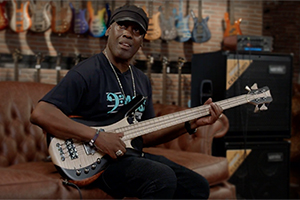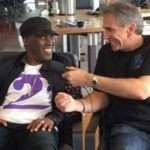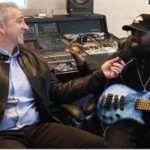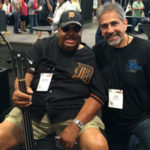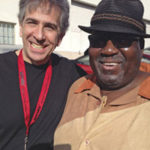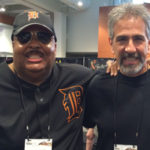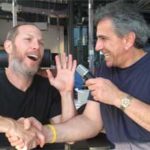After Beyoncé, Ne-Yo, Aaliyah, Salt-N-Pepa, Boyz II Men and countless others, Detroit-bred groover is currently touring with Lady Gaga. Here is his story, in his own words!
Exclusive interview with FBPO’s Jon Liebman
October 8, 2012
A native of Detroit, Michigan, Kern Brantley is an accomplished bass player, producer, songwriter and arranger. Kern has performed and/or toured with Beyoncé, Mary J. Blige, Ne-Yo, Brandy, Destiny’s Child, Ginuwine, Whitney Houston, R. Kelly, Salt-N-Pepa, Boyz II Men, Monica, Aaliyah, Bobby Brown, Earl Klugh, Grover Washington Jr., the Winans and countless others. His recording credits include Will Smith, LL Cool J, Jay-Z, Aretha Franklin, the Clark Sisters, Eddie Murphy and many more. Kern is currently touring as bandleader and bassist with music sensation Lady Gaga.
FBPO: How would you describe your musical upbringing?
KB: My musical upbringing basically began at home with my mother and brothers. My mom had ten kids, six biological and four adopted, so she purchased some drums, guitars and a piano and we would just play music around the house as kids for fun. We would do shows in our basement and on our front porch for the neighborhood kids. We also did local talent shows at recreation centers, schools and at church.
FBPO: How did you become a bass player?
KB: I was first playing guitar with my oldest brother, but I would play the bass parts. One day we went to take some guitar lessons and the teacher said, “You’re playing the bass line,” and suggested I try the bass guitar instead.
FBPO: Who were your influences as a young, up-and-coming bass player?
KB: From the beginning, my influences were Jaco Pastorius, Stanley Clarke and James Jamerson. Then I got more in to players like Bootsy Collins, Verdine White, Larry Graham and Louis Johnson and later Marcus Miller and Nathan East.
FBPO: How do you think growing up in Detroit affected you musically? We sure have a lot of music history here!
KB: Growing up in Detroit, I was surrounded by so many local talented musicians and singers, in both the churches and the clubs. Some of my early music teachers were Motown session players, the Funk Brothers, including Earl Van Dyke, Beans Bowles and Paul Riser, as well as some of Detroit’s top jazz players, like Earl Klugh, Kamau Kenyatta and Vassal Benford. I was surrounded by some of Detroit’s top gospel artists, too. Thomas Whitfield mentored me and the Winans family and the Clark Sisters took me on the road and in the studio. They all had a huge part in my musical up bringing in Detroit.
I also got to record in the studio with The Queen of Soul, Aretha Franklin, as well as Anita Baker’s producer, Michael J, Powell, and classical producer, Robert Sadin, while in Detroit. Also located in Detroit at that time were the “P-Funk Labs” at United Sound Studio, where I first met George Clinton, Bootsy Collins and members of the Funkadelic band and where I also recorded with the Queen of Funk, Mallia Franklin.
FBPO: When did your career really start to take off? Was there a triggering event or did it happen more gradually?
KB: My first professional break came when I was about 18. I was playing at a local restaurant in the suburbs of Detroit in a jazz band and local jazz star Earl Klugh was there with his manager having dinner. They later approached me and asked if I would like to audition for Earl’s band at Baker’s Keyboard Lounge in Detroit. I got the gig and toured with Earl for about two years. After that, I went back to school in Dearborn, Michigan, and studied music education, but dropped out of college two years later. I met Thomas Whitfield and he took me under his wing and into the studio to record over fifty gospel recordings. He also introduced me to Marvin Winans and Twinkie Clark, with whom I recorded several records in Detroit and Nashville.
FBPO: And one thing led to another after that?
KB: Pretty much. While playing with the Winans at the Apollo Theater in New York City, I met Teddy Riley, who flew me back to NYC to work with his group, Guy, on the New Jack Swing tour. While in New York, I began to network. My friend Robert Sadin hooked me up with two major jazz auditions, Wayne Shorter and the late Grover Washington, Jr. I got the gig with Grover and toured around the world with him for about four years. He was also a mentor.
Going back to NYC, bassist Artie Reynolds, who was playing with Najee at the time, told me about an audition for then up-and-coming hip-hop artist Mary J. Blige. I auditioned for her and was hired as her musical director. From there, she introduced me to Sean “P-Diddy” Combs and I was musical director for several Bad Boy artists. Via Puffy, I played on recordings by Will Smith, Jay-Z and LL Cool J. By then I had a pretty good reputation in New York and began working with other artists, like Blackstreet, Keith Sweat, Bobby Brown, SWV and New Kids on the Block.
FBPO: It looks like you became established rather quickly. I know there’s more, though!
KB: Well, back in Detroit, I hooked up with another Detroit superstar, Aaliyah, which led to me being MD for R. Kelly. After that, I got calls from R&B artists Ciara, Ne-Yo, Brandy, Monica and Chris Brown and hip-hop artists Young Jeezy and Lil Wayne. The next big break was from Beyoncé, followed by Destiny’s Child, both cases as MD. My brother, Valdez Brantley, is currently music director for Usher and I am currently bandleader and bassist for Lady Gaga, who I was referred to by my friend, her musical director, Joe “Flip” Wilson. It’s all about networking and relationships.
FBPO: You’ve done a lot of work, not only as a sideman, but often as musical director, too, which is a very different kind of responsibility. Can you share some insights into making that transition?
KB: Making the transition from sideman to musical director has been easy for me because I believe in order to a good leader, you must first be a good follower. You should give the MD the same respect that you would want as an MD. As MD, I have to know and identify all the musical parts and lyrics of the music, as well as have good people relations with several musicians and singers that are right for the gig. In today’s music, it is also important to have knowledge of computers and software, like Pro Tools, Logic Pro and Digital Performer.
FBPO: What about the future? Where else do you hope your career will take you?
KB: I hope in the future to become musical director for a late night television show or a film soundtrack producer. I’m also quite interested in doing more record production work and/or record executive duties.
FBPO: What would you be if you weren’t a bass player?
KB: I’d probably be doing something in electronics or work in a technology-based business.
FBPO: “Bonus” question! I see your name is actually Lanar. How did you get your nickname?
KB: My nickname, “Kern,” was a name my late grandmother used to call me as a kid. I use to love the cereal CAP’N CRUNCH and she used to call me Kernal Crunch. Then it got shorted to just Kern. I used that name because it was easy to remember.
